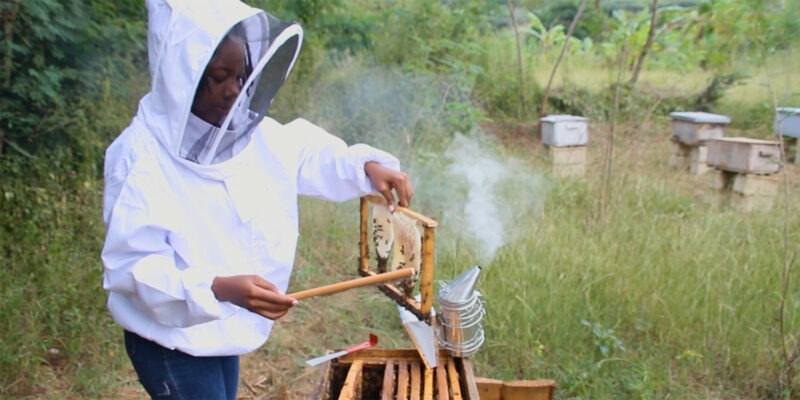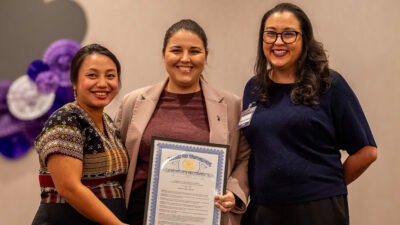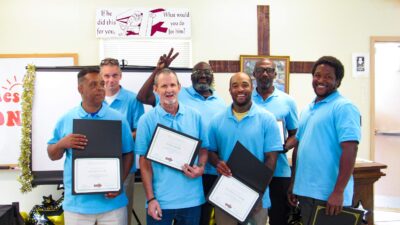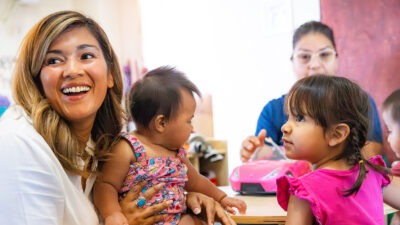This post is also available in: Español (Spanish) Kreyòl (Haitian Creole)
In brief
Ingenuity and leadership across Haiti are transforming the country’s food system. As part of the Haiti Food System Alliance, the Centre Haitien du Leadership et de l’Excellence (CLE) invests in training, enterprise development and systems change to strengthen food production, distribution and consumption. The goal: center Haitian-grown, Haitian-made and Haitian-led solutions.
The 2024 Chanpyon Lakay competition celebrated five standout agricultural business owners doing just that. Each winner is advancing practical, community-rooted responses to some of the country’s most pressing challenges — from strengthening food systems to building sustainable local economies.
Organized by CLE, Chanpyon Lakay is the exclamation point of its yearlong Angaje program. The latest Angaje cohort brought together 100 promising entrepreneurs — 65% of whom were women — for intensive training and support. Aided by expert coaching, consulting and seed funding, these leaders highlighted agricultural products that strengthen their communities — from raising bees and harvesting honey to supporting cassava farmers by buying and processing their crops, to poultry farming and sugarcane processing.
The competition builds on years of strategic partnership between CLE, the W.K. Kellogg Foundation, and other funders and partners like Dunn Family Charitable Foundation and DF Capital who are promoting youth entrepreneurship in agriculture by uplifting the creativity, determination and leadership of Haiti’s next generation of social entrepreneurs. The 2024 winners, selected from this dynamic cohort, were announced in March 2025 and awarded cash prizes.
Why this matters
For decades, harmful trade policies, international interference and underinvestment in rural economies have weakened Haiti’s food systems. In the 1980s and 1990s, pressured by international lenders, Haiti cut tariffs on imports — especially U.S. rice — undermining local farmers and flooding markets with subsidized goods. When the 2010 earthquake devastated infrastructure and displaced more than one million people, recovery efforts were often mismanaged or diverted away from Haitian-led solutions.
Today, food insecurity remains one of Haiti’s most urgent challenges. More than five million people — about 51% of the population — are food insecure, meaning they don’t have reliable access to enough affordable, nutritious food. Rising food prices, which have increased by 25% in the past year, are making basic staples unaffordable for many families.
Yet across the country, Haitian entrepreneurs are leading the way forward. CLE supports women and youth to develop business ideas into livelihoods that enable long-term systems transformation. In partnership with the Haiti Food System Alliance, CLE and its leaders are restoring food production, growing rural economies and creating sustainable jobs. Programs like Angaje and competitions like Chanpyon Lakay put decision-making and opportunity back in Haitian hands.
Meet the 2024 Chanpyon Lakay winners
Gran Chanpyon Lakay (Grand Prize Winner)
Dacheline Joseph – Univers Apicole
Dacheline Joseph founded Univers Apicole to strengthen Haiti’s honey industry and create new opportunities for beekeepers. Her business prioritizes quality, environmental sustainability and education — collaborating with local producers to modernize practices and increase supply. As demand grows, Univers Apicole will use the grant to expand operations, create jobs and protect the environment through pollinator-friendly methods.
Winners
Elpharson Cantave – Group of Young Agro-Entrepreneurs (GAJA)
Founded by eight young leaders, the Group of Young Agro-Entrepreneurs (GAJA) is revitalizing cassava production to strengthen food systems and reduce food insecurity. Their model equips rural farming families with tools, training and guaranteed purchase agreements. In just one year, GAJA has supported 37 farming families and employed 18 workers — 75% of them women — while promoting nutritious, locally grown foods across Haiti.
Pierre Maillard Etienne – Agrifarmart Haiti
In response to supply chain disruptions, Agrifarmart Haiti is strengthening Haiti’s poultry sector through domestic egg and chicken production. The business delivers high-quality, vaccinated poultry and ongoing support to farmers across multiple regions. It also provides internships that promote food system leadership among university students.
Darius Dorescar – APAT.SA
Founded in 2022, APAT.SA is revitalizing Haiti’s honey industry through quality production and innovative beekeeping tools. With 42 active hives and growing demand, the company is building a national beekeeping network to support livelihoods, protect pollinators and ensure access to trusted, pesticide-free honey.
Charmantherve Bedjine Joseph – Richès Pwodwi Lokal
Through Richès Pwodwi Lokal, Charmantherve is modernizing Haiti’s sugarcane sector while honoring its cultural roots. Her business transforms sugarcane into juice, syrup (under the Pampidou brand) and rapadou — a traditional molasses-rich cane sugar. By providing technical support and market access, she’s helping farmers — like her father — boost incomes and strengthen community pride.
The opportunity
The 2024 Chanpyon Lakay winners are advancing community-based solutions that promote food security, economic opportunity and sustainable development.
With continued support, these ventures can scale their impact — advancing food sovereignty, gender equity, environmental resilience and inclusive growth. Investing in them is investing in Haiti’s future.
Learn more:







Comments